Unit10 I've had this bike for three years.Section A Grammar Focus-4c 语法优质课课件(共18张PPT)
文档属性
| 名称 | Unit10 I've had this bike for three years.Section A Grammar Focus-4c 语法优质课课件(共18张PPT) | 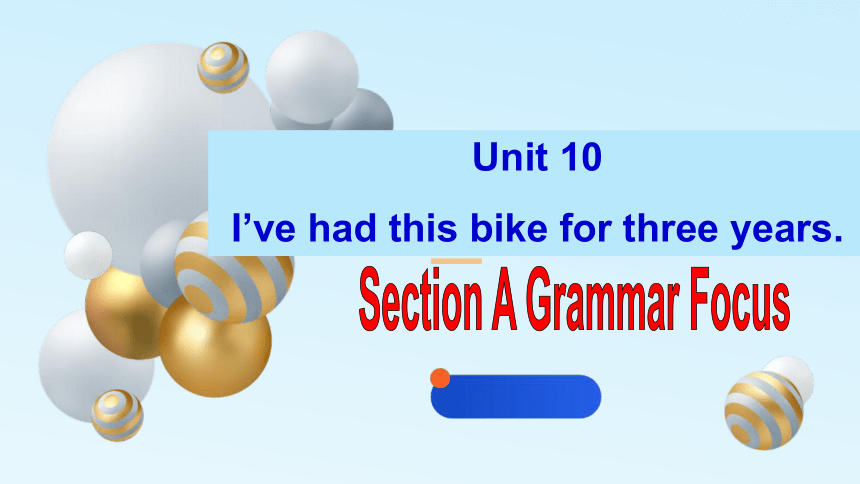 | |
| 格式 | pptx | ||
| 文件大小 | 1005.0KB | ||
| 资源类型 | 试卷 | ||
| 版本资源 | 人教新目标(Go for it)版 | ||
| 科目 | 英语 | ||
| 更新时间 | 2025-02-12 15:43:01 | ||
图片预览

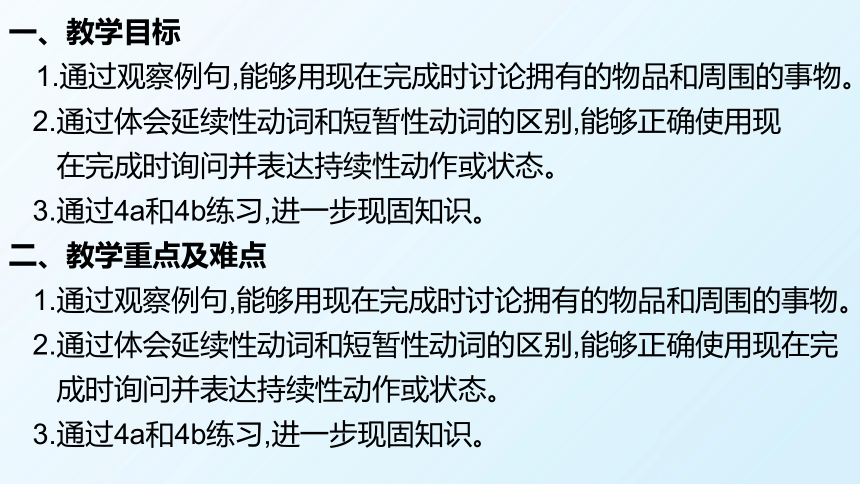
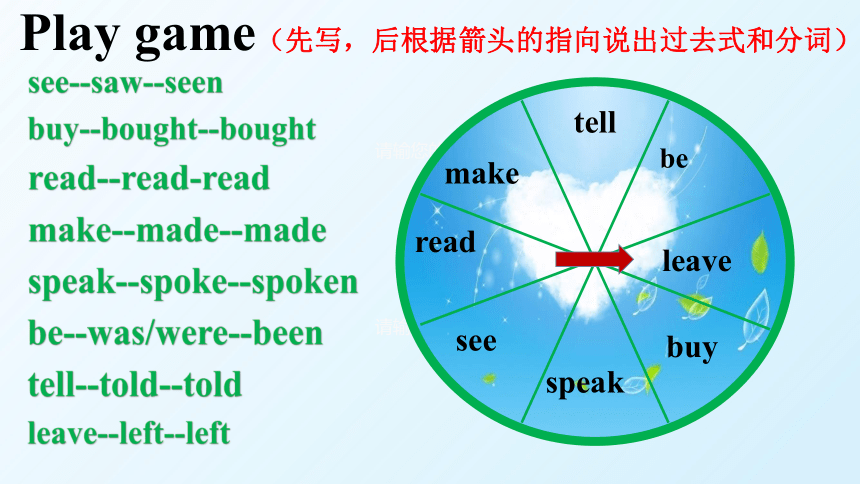
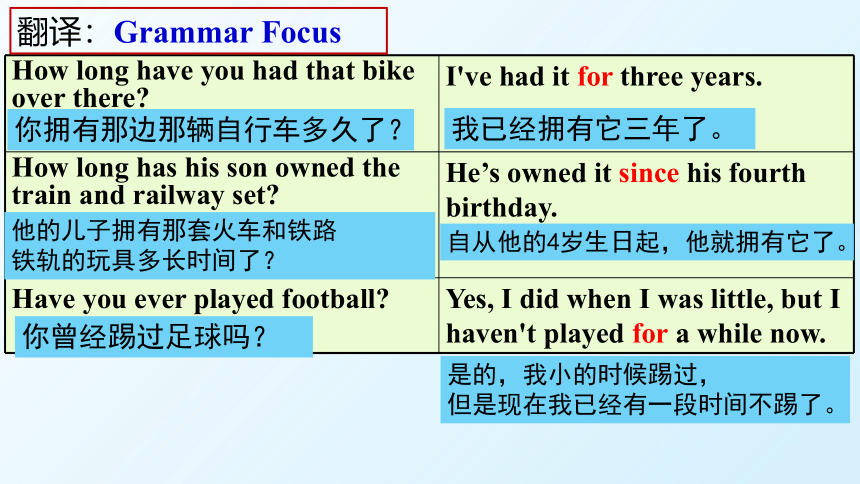
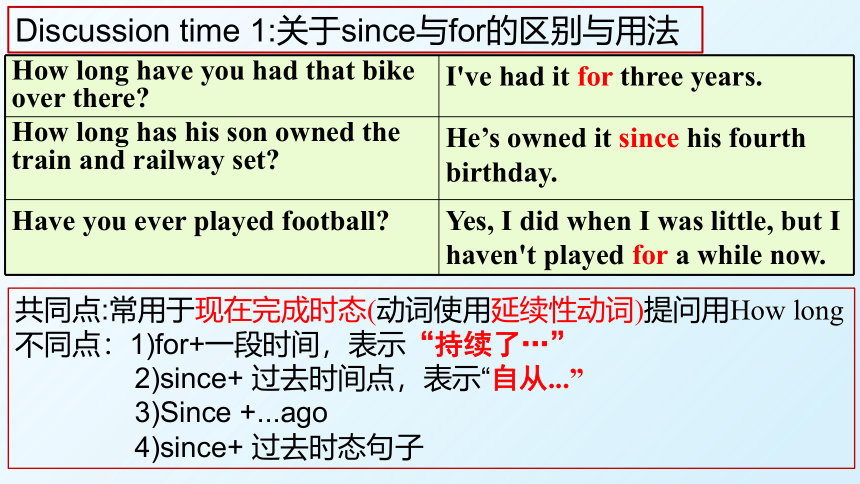
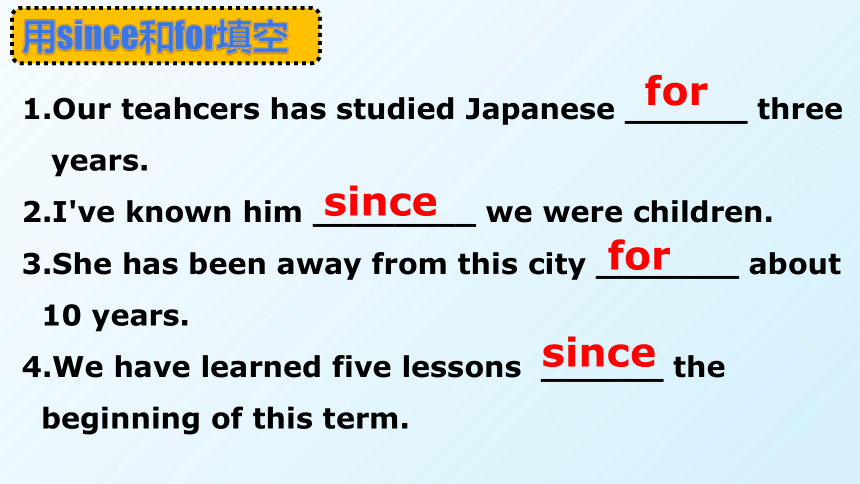
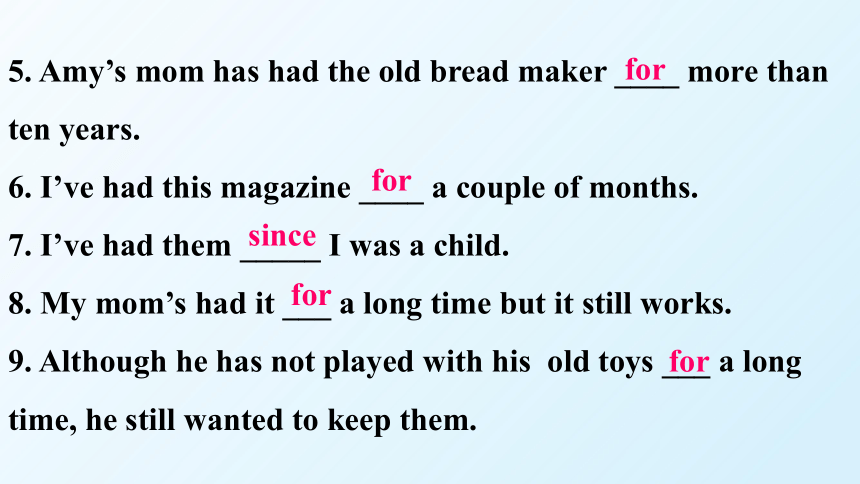
文档简介
(共18张PPT)
Unit 10
I’ve had this bike for three years.
Section A Grammar Focus
一、教学目标
1.通过观察例句,能够用现在完成时讨论拥有的物品和周围的事物。
2.通过体会延续性动词和短暂性动词的区别,能够正确使用现
在完成时询问并表达持续性动作或状态。
3.通过4a和4b练习,进一步现固知识。
二、教学重点及难点
1.通过观察例句,能够用现在完成时讨论拥有的物品和周围的事物。
2.通过体会延续性动词和短暂性动词的区别,能够正确使用现在完
成时询问并表达持续性动作或状态。
3.通过4a和4b练习,进一步现固知识。
请输您的标题
请输入您的标题
Play game(先写,后根据箭头的指向说出过去式和分词))
see--saw--seen
buy--bought--bought
read--read-read
make--made--made
speak--spoke--spoken
be--was/were--been
tell--told--told
leave--left--left
read
tell
make
be
see
speak
leave
buy
How long have you had that bike over there I've had it for three years.
How long has his son owned the train and railway set He’s owned it since his fourth birthday.
Have you ever played football Yes, I did when I was little, but I haven't played for a while now.
翻译:Grammar Focus
你拥有那边那辆自行车多久了?
我已经拥有它三年了。
他的儿子拥有那套火车和铁路
铁轨的玩具多长时间了?
自从他的4岁生日起,他就拥有它了。
你曾经踢过足球吗?
是的,我小的时候踢过,
但是现在我已经有一段时间不踢了。
Discussion time 1:关于since与for的区别与用法
How long have you had that bike over there I've had it for three years.
How long has his son owned the train and railway set He’s owned it since his fourth birthday.
Have you ever played football Yes, I did when I was little, but I haven't played for a while now.
共同点:常用于现在完成时态(动词使用延续性动词)提问用How long
不同点:1)for+一段时间,表示“持续了…”
2)since+ 过去时间点,表示“自从...”
3)Since +...ago
4)since+ 过去时态句子
用since和for填空
1.Our teahcers has studied Japanese ______ three
years.
2.I've known him ________ we were children.
3.She has been away from this city _______ about
10 years.
4.We have learned five lessons ______ the
beginning of this term.
for
since
for
since
5. Amy’s mom has had the old bread maker ____ more than ten years.
6. I’ve had this magazine ____ a couple of months.
7. I’ve had them _____ I was a child.
8. My mom’s had it ___ a long time but it still works.
9. Although he has not played with his old toys ___ a long time, he still wanted to keep them.
for
for
since
for
for
Discussion time 2:
与how long,for 或者since 搭配使用现在完成时中的动词有什么特点
A:Tony has bought the computer for 2 years.
Tony has had the computer for 2 years.
B:Maria has come back since Monday.
Maria has been back since Monday.
C:How long has Mary left ?
How long has Mary been away?
判断正误
总结:在以下句型中,短暂性动词要转换成延续性动词
how long,for 或者since 搭配使用现在完成时中的动词有什么特点
Discussion time 2:
1. ...for +一段时间
2. ...since +过去的时间点
3. ...since + 一段时间+ ago
4. since + 从句(一般过去时态)
5. How long 引导的问句
巧记瞬间性动词的转换:
开始离去借来还, 出生入死买到家,
穿衣入睡要感冒, 开开关关变结束。
1 begin开始 be on 6 return还 be back
2 leave离开 be away from 7 join加入 be in
3 go去 be off 8 die死 be dead
4 borrow借 keep 9 buy买 have
5 come来 be here 10 arrive到 be here
10 reach到 be here 11 put on穿 wear
12 fall asleep 入睡 be asleep 13 catch a cold 感冒 have a cold
14 open be open 15 close关 be closed
16 become变 be 17 end/finish结束 be over
巧记瞬间性动词的转换:
开始离去借来还, 出生入死买到家,
穿衣入睡要感冒, 开开关关变结束。
Li Lei joined the Party three years ago.(同义句)
Li Lei ____ ____ ____the Party ______ three years.
Li Lei ____ ____ ____the Party _____ three years ago.
2. My father left Guizhou last week.(同义句)
My father ___ ____ ____ ____Guizhou ______a week.
My father ___ _____ ____ ____Guizhou ____ last week.
3. The factory opened in1996.(同义句)
The factory ____ ____ ____ _____ten years.
The factory ____ _____ _____ since 1996.
【即学即练】
join加入某个组织(短暂)—be in+组织(状态)
has been in
for
has been in
since
leave离开某地(短暂)
—be away from(状态)
has been away from
for
has been away from
since
open开业,营业(短暂)
—be open(状态)
has been open for
has been open
Practice
4a. Rewrite the sentences using for or since.
Jim is in Japan. He arrived there three days ago.
__________________________________
2. They are very hungry. Their last meal was ten hours ago.
____________________________________
3. I have a camera. I bought it in 2009.
_______________________________
4. I know Anna. I first met her three years ago.
___________________________________
5. Linda is ill. She became ill on Monday.
____________________________________
get to\arrive in(at)\reach+地点—be in +地点
Jim has been in Japan for three days\since three days.
eat—have
They haven’t had anything for ten hours\since ten hours ago .
buy— have
I have had a camera since 2009.
meet— know
I have known Anna for three years\since three years ago.
become ill—be ill
Linda has been ill since Monday.
4b. Fill in the blanks with the correct forms of the verbs in brackets.
1. I ______________ (never be) to the water park before. I want to ____ (go) next month before the weather gets too cold.
2.They__________________(never own) any pets, but they ______________________ (always want) to have a dog.
3. We_______ (have) a piano since last November. We _______ (buy) it from the Li family when they moved to the US last year.
4. Cathy and Amy _______________(not be) back to their hometown for two years. They ____ (miss) their hometown a lot and hope to visit the place next year.
5. This museum ________ (be) here for over 20 years. It _____ (be) one of the oldest buildings in this small town.
提示:根据句意和时间状语提示词,决定句子时态和动词形式
have never been
go
have never owned
have always wanted
have had
bought
haven’t been
miss
has been
is
4c. Fill in the questions and ask two students.
Then complete the chart.
Things How long
Tony favorite book for two years
basketball since he was 10 years old
student 1
student 2
1. Do you have a (n)_________ How long have you had it
2. Do you own a (n)__________ How long have you owned it
For example: My friend Jenny has a train set. She has owned it since she was two years old.
My classmate Tony has a football T-shirt. He has had it for three years.
一、将下列短暂性动词转化成对应的延续性形式
borrow- buy- put on-
begin\start- die- open-
get to \arrive in (at)\reach-
leave- finish- fall ill-
fall asleep- join-
go to school-
become- close-
keep
bought
wear
be on
be dead
be open
be in+地点
be away (from)
be over
be ill
be asleep
be in+活动\组织
be in school
be
be closed
二、翻译句子
自打五年前我就有这套火车和铁轨套装玩具了。
Tara离开家已经两个月了。
这本书我已经借了两周了。
这辆自行车我买了两年了。
那只猫已经死了两天了。
电影已经结束10分钟了。
有,拥有— have\own
I have had (owned) this train and railway set since five years ago.
leave— be away (from)
Tara has been away from home for two months.
borrow— keep
I have kept this book for two weeks.
buy— have
I have had this bike for two years.
die— be dead
The cat has been dead for two days.
finish— be over
The film has been over for ten minutes.
Thank you for listening!
Unit 10
I’ve had this bike for three years.
Section A Grammar Focus
一、教学目标
1.通过观察例句,能够用现在完成时讨论拥有的物品和周围的事物。
2.通过体会延续性动词和短暂性动词的区别,能够正确使用现
在完成时询问并表达持续性动作或状态。
3.通过4a和4b练习,进一步现固知识。
二、教学重点及难点
1.通过观察例句,能够用现在完成时讨论拥有的物品和周围的事物。
2.通过体会延续性动词和短暂性动词的区别,能够正确使用现在完
成时询问并表达持续性动作或状态。
3.通过4a和4b练习,进一步现固知识。
请输您的标题
请输入您的标题
Play game(先写,后根据箭头的指向说出过去式和分词))
see--saw--seen
buy--bought--bought
read--read-read
make--made--made
speak--spoke--spoken
be--was/were--been
tell--told--told
leave--left--left
read
tell
make
be
see
speak
leave
buy
How long have you had that bike over there I've had it for three years.
How long has his son owned the train and railway set He’s owned it since his fourth birthday.
Have you ever played football Yes, I did when I was little, but I haven't played for a while now.
翻译:Grammar Focus
你拥有那边那辆自行车多久了?
我已经拥有它三年了。
他的儿子拥有那套火车和铁路
铁轨的玩具多长时间了?
自从他的4岁生日起,他就拥有它了。
你曾经踢过足球吗?
是的,我小的时候踢过,
但是现在我已经有一段时间不踢了。
Discussion time 1:关于since与for的区别与用法
How long have you had that bike over there I've had it for three years.
How long has his son owned the train and railway set He’s owned it since his fourth birthday.
Have you ever played football Yes, I did when I was little, but I haven't played for a while now.
共同点:常用于现在完成时态(动词使用延续性动词)提问用How long
不同点:1)for+一段时间,表示“持续了…”
2)since+ 过去时间点,表示“自从...”
3)Since +...ago
4)since+ 过去时态句子
用since和for填空
1.Our teahcers has studied Japanese ______ three
years.
2.I've known him ________ we were children.
3.She has been away from this city _______ about
10 years.
4.We have learned five lessons ______ the
beginning of this term.
for
since
for
since
5. Amy’s mom has had the old bread maker ____ more than ten years.
6. I’ve had this magazine ____ a couple of months.
7. I’ve had them _____ I was a child.
8. My mom’s had it ___ a long time but it still works.
9. Although he has not played with his old toys ___ a long time, he still wanted to keep them.
for
for
since
for
for
Discussion time 2:
与how long,for 或者since 搭配使用现在完成时中的动词有什么特点
A:Tony has bought the computer for 2 years.
Tony has had the computer for 2 years.
B:Maria has come back since Monday.
Maria has been back since Monday.
C:How long has Mary left ?
How long has Mary been away?
判断正误
总结:在以下句型中,短暂性动词要转换成延续性动词
how long,for 或者since 搭配使用现在完成时中的动词有什么特点
Discussion time 2:
1. ...for +一段时间
2. ...since +过去的时间点
3. ...since + 一段时间+ ago
4. since + 从句(一般过去时态)
5. How long 引导的问句
巧记瞬间性动词的转换:
开始离去借来还, 出生入死买到家,
穿衣入睡要感冒, 开开关关变结束。
1 begin开始 be on 6 return还 be back
2 leave离开 be away from 7 join加入 be in
3 go去 be off 8 die死 be dead
4 borrow借 keep 9 buy买 have
5 come来 be here 10 arrive到 be here
10 reach到 be here 11 put on穿 wear
12 fall asleep 入睡 be asleep 13 catch a cold 感冒 have a cold
14 open be open 15 close关 be closed
16 become变 be 17 end/finish结束 be over
巧记瞬间性动词的转换:
开始离去借来还, 出生入死买到家,
穿衣入睡要感冒, 开开关关变结束。
Li Lei joined the Party three years ago.(同义句)
Li Lei ____ ____ ____the Party ______ three years.
Li Lei ____ ____ ____the Party _____ three years ago.
2. My father left Guizhou last week.(同义句)
My father ___ ____ ____ ____Guizhou ______a week.
My father ___ _____ ____ ____Guizhou ____ last week.
3. The factory opened in1996.(同义句)
The factory ____ ____ ____ _____ten years.
The factory ____ _____ _____ since 1996.
【即学即练】
join加入某个组织(短暂)—be in+组织(状态)
has been in
for
has been in
since
leave离开某地(短暂)
—be away from(状态)
has been away from
for
has been away from
since
open开业,营业(短暂)
—be open(状态)
has been open for
has been open
Practice
4a. Rewrite the sentences using for or since.
Jim is in Japan. He arrived there three days ago.
__________________________________
2. They are very hungry. Their last meal was ten hours ago.
____________________________________
3. I have a camera. I bought it in 2009.
_______________________________
4. I know Anna. I first met her three years ago.
___________________________________
5. Linda is ill. She became ill on Monday.
____________________________________
get to\arrive in(at)\reach+地点—be in +地点
Jim has been in Japan for three days\since three days.
eat—have
They haven’t had anything for ten hours\since ten hours ago .
buy— have
I have had a camera since 2009.
meet— know
I have known Anna for three years\since three years ago.
become ill—be ill
Linda has been ill since Monday.
4b. Fill in the blanks with the correct forms of the verbs in brackets.
1. I ______________ (never be) to the water park before. I want to ____ (go) next month before the weather gets too cold.
2.They__________________(never own) any pets, but they ______________________ (always want) to have a dog.
3. We_______ (have) a piano since last November. We _______ (buy) it from the Li family when they moved to the US last year.
4. Cathy and Amy _______________(not be) back to their hometown for two years. They ____ (miss) their hometown a lot and hope to visit the place next year.
5. This museum ________ (be) here for over 20 years. It _____ (be) one of the oldest buildings in this small town.
提示:根据句意和时间状语提示词,决定句子时态和动词形式
have never been
go
have never owned
have always wanted
have had
bought
haven’t been
miss
has been
is
4c. Fill in the questions and ask two students.
Then complete the chart.
Things How long
Tony favorite book for two years
basketball since he was 10 years old
student 1
student 2
1. Do you have a (n)_________ How long have you had it
2. Do you own a (n)__________ How long have you owned it
For example: My friend Jenny has a train set. She has owned it since she was two years old.
My classmate Tony has a football T-shirt. He has had it for three years.
一、将下列短暂性动词转化成对应的延续性形式
borrow- buy- put on-
begin\start- die- open-
get to \arrive in (at)\reach-
leave- finish- fall ill-
fall asleep- join-
go to school-
become- close-
keep
bought
wear
be on
be dead
be open
be in+地点
be away (from)
be over
be ill
be asleep
be in+活动\组织
be in school
be
be closed
二、翻译句子
自打五年前我就有这套火车和铁轨套装玩具了。
Tara离开家已经两个月了。
这本书我已经借了两周了。
这辆自行车我买了两年了。
那只猫已经死了两天了。
电影已经结束10分钟了。
有,拥有— have\own
I have had (owned) this train and railway set since five years ago.
leave— be away (from)
Tara has been away from home for two months.
borrow— keep
I have kept this book for two weeks.
buy— have
I have had this bike for two years.
die— be dead
The cat has been dead for two days.
finish— be over
The film has been over for ten minutes.
Thank you for listening!
同课章节目录
- Unit 1 What's the matter?
- Section A
- Section B
- Unit 2 I'll help to clean up the city parks.
- Section A
- Section B
- Unit 3 Could you please clean your room?
- Section A
- Section B
- Unit 4 Why don't you talk to your parents?
- Section A
- Section B
- Unit 5 What were you doing when the rainstorm came
- Section A
- Section B
- Review of Units 1-5
- Unit 6 An old man tried to move the mountains.
- Section A
- Section B
- Unit 7 What's the highest mountain in the world?
- Section A
- Section B
- Unit 8 Have you read Treasure Island yet?
- Section A
- Section B
- Unit 9 Have you ever been to a museum?
- Section A
- Section B
- Unit 10 I've had this bike for three years.
- Section A
- Section B
